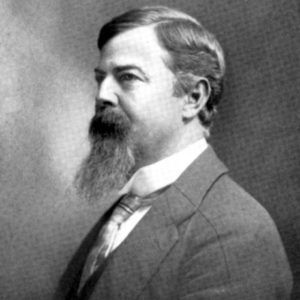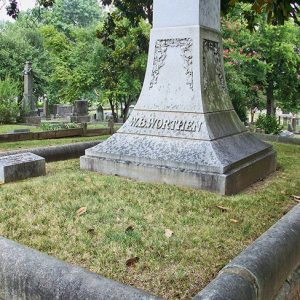calsfoundation@cals.org
William Booker (W. B.) Worthen (1852–1911)
William Booker Worthen was a banker in Arkansas from 1874 until his death in 1911, and he also wrote a history of Arkansas banking. The bank he founded survived recessions and the Great Depression, becoming the largest bank holding company in the state, until being acquired by Boatmen’s Bank in 1994. It is now part of Bank of America.
Born in Little Rock (Pulaski County) on September 17, 1852, one of four children of George Alfonso Worthen and Louisa Booker Worthen, W. B. Worthen grew up in the turbulent times surrounding the Civil War. His father, a merchant with a variety of business interests, died as a civilian in 1864. After the Civil War, Worthen studied as a cadet at St. Johns’ College in Little Rock for two years before becoming a rod man with an engineering firm. In 1869, he was employed by David F. Shall in his real estate and brokerage business. When Shall was killed by a stray bullet during the Brooks-Baxter War in 1874, Worthen joined Colonel Gordon Neill Peay to form Peay & Worthen, a private banking firm in Little Rock. Peay died in December 1876, at which time Edward W. Parker and Worthen created Parker & Worthen, “Bankers, Brokers and Real Estate Agents,” a partnership that began on January 1, 1877, and was initially located in a one-story building at the corner of Louisiana and Markham streets.
On June 3, 1879, Worthen married Mollie Crease Peay, daughter of his late partner. They had five children. In 1882, the couple built a large home at 704 West 2nd St., which was occupied by the family until Mollie Worthen’s death on October 10, 1944.
The partnership prospered, and Worthen bought Parker’s share in 1888 and began conducting business as W. B. Worthen & Company. In 1902, W. B. Worthen & Company became incorporated with capital stock of $100,000. One of sixteen banks in the growing city of Little Rock, Worthen Bank moved to space in the Metropolitan Hotel at the corner of Markham and Main in 1904. By 1911, Worthen could report to the stock-holders capital of $100,000, surplus of $200,000, and undivided profits of $80,415. Family members were the primary stock-holders.
Worthen personally invested in a variety of enterprises, including the Arkansas Gazette newspaper. Twice in the 1890s he served as president of the Gazette Publishing Company, and he held controlling interest in the company when the Gazette was sold to the Heiskell family in 1902. In 1906, the Arkansas Bankers Association, appreciative of Worthen’s career in the profession, requested that he write a history of banking in the state. The product, Early Banking in Arkansas (1906), remains the definitive history of banking in nineteenth-century Arkansas.
Worthen died after a short illness on October 23, 1911. Upon his death, the Arkansas Democrat editorialized that “some of the largest and most important financial transactions of the State were engineered and executed by Mr. Worthen…with unswerving integrity and honesty of purpose.” The Little Rock [Bank] Clearing House Association prepared a memorial resolution praising his exceptional talent for banking and his seemingly “excessive” courage that later usually proved justified, calling him a “tower of strength” in times of panic and “a remarkable judge of men.” The family, including his widow Mollie Worthen, retained majority ownership in the bank. During the Great Depression, a challenging time for the banking business, Mollie Worthen and the rest of the family were able to recapitalize Worthen Bank and continue business after President Franklin D. Roosevelt’s “Bank Holiday.” By the end of 1933, only five banks remained in business in Little Rock, with Worthen Bank the only one with continuity of ownership and management back to the founder.
For additional information:
“A Tribute to Mollie Peay Worthen.” Pulaski County Historical Society Review 19 (December 1971): 45–51.
Walsh, Mary Phyllis. In the Vaults of Time. Little Rock: 1976.
“William Booker Worthen is Dead.” Arkansas Gazette. October 24, 1911, pp. 1, 3.
Worthen, W. B. Early Banking in Arkansas. Little Rock: Arkansas Bankers’ Association, 1906.
Worthen Bank Records. Butler Center for Arkansas Studies. Central Arkansas Library System, Little Rock, Arkansas.
William B. Worthen
Historic Arkansas Museum
 Booker Worthen Literary Prize
Booker Worthen Literary Prize W. B. Worthen
W. B. Worthen  W. B. Worthen Gravesite
W. B. Worthen Gravesite  Worthen Bank
Worthen Bank 




Comments
No comments on this entry yet.